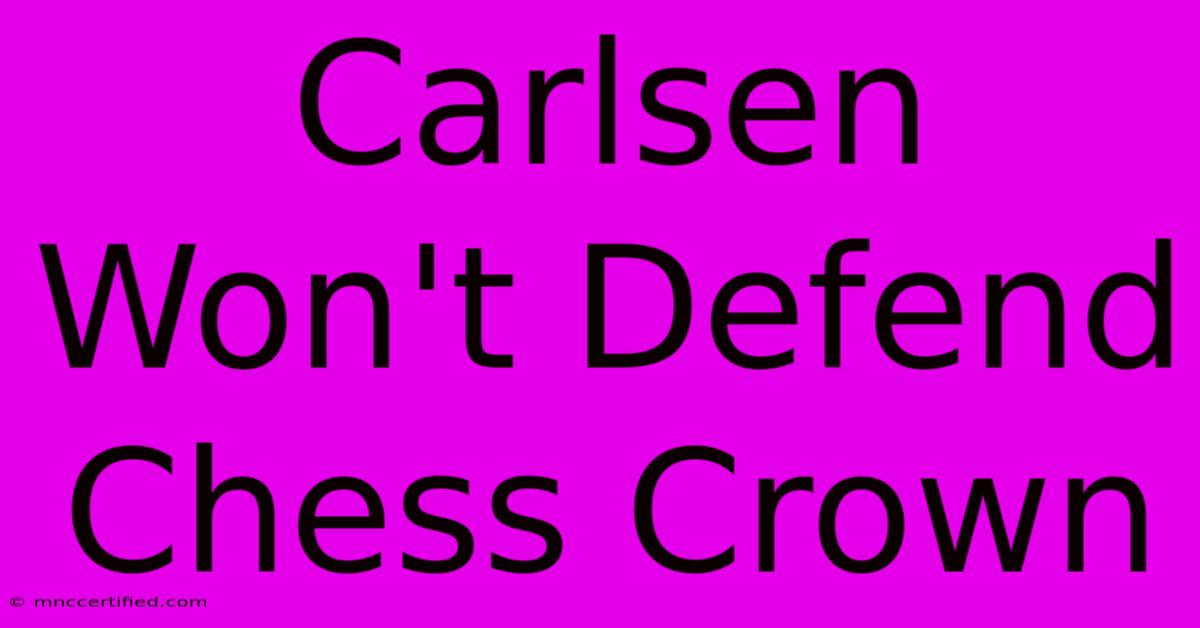Carlsen Won't Defend Chess Crown

Table of Contents
Carlsen Won't Defend Chess Crown: A Shock to the Chess World
The chess world is reeling from the announcement that Magnus Carlsen, the reigning World Chess Champion, will not defend his title. This unexpected decision, announced on [Date of Announcement], sends shockwaves through the chess community and leaves a significant void at the top of the game. This article delves into the reasons behind Carlsen's decision, its implications for the future of chess, and what we can expect next.
The Reign of Magnus Carlsen: A Legacy Undisputed
Magnus Carlsen's dominance in the world of chess is undeniable. His five-year reign as World Champion, marked by exceptional strategic prowess and an almost superhuman ability to calculate variations, cemented his place as one of the greatest chess players of all time. His aggressive playing style, combined with a deep understanding of positional chess, has captivated audiences worldwide, bringing unprecedented attention to the game. Carlsen's impact transcends mere titles; he is a global ambassador for chess.
Beyond the Crown: Carlsen's Wider Influence
Carlsen's influence extends far beyond the chessboard. His numerous endorsements, appearances in popular culture, and online presence have significantly broadened the appeal of chess to a younger generation. He's not just a chess player; he's a brand, a personality, and a driving force behind the game's growing popularity. His decision not to defend his title raises questions about the future of this influence.
Why Did Carlsen Choose Not to Defend His Title?
While Carlsen himself has offered some explanations, the exact reasoning remains somewhat shrouded in mystery. However, several key factors are likely at play:
The Lack of Motivation: A Burning Out Champion?
One prominent reason cited is a lack of motivation. Maintaining the level of intensity required to compete at the highest level for so long is incredibly demanding, both mentally and physically. The pressure of defending a title, especially with the level of expectation surrounding Carlsen, could be a significant factor. It's possible that Carlsen feels he's reached a point where the drive to compete at this level has diminished.
Focusing on Other Challenges: Exploring New Frontiers
Carlsen has expressed an interest in exploring other avenues within the chess world. He is already actively involved in various chess-related projects, including online chess platforms and commentary. This decision could allow him to focus more energy on these pursuits, leaving behind the intense pressure of competitive chess. This opens up exciting possibilities for the future of online chess and the growth of the game's digital presence.
The Aspiration for a Different Kind of Legacy: Beyond Winning
Perhaps Carlsen's decision is less about a loss of motivation and more about a shift in priorities. His legacy is already secure; he's achieved more than most players ever dream of. Now, he might be looking to build a legacy beyond simply accumulating titles. This could involve fostering the next generation of chess players or creating innovative ways to engage audiences with the game.
The Future of Chess: What Happens Next?
Carlsen's decision throws the future of the World Chess Championship into uncertainty. The governing body, FIDE, will need to decide on a new format and process for determining the next champion. This could lead to significant changes in the structure of the championship and potentially open doors for new players to rise to prominence. The absence of Carlsen will create a power vacuum, and the competition to fill it will be fierce.
Opportunities for Rising Stars: A New Era Begins
With Carlsen stepping aside, the path to the World Championship is now wide open. This creates an unprecedented opportunity for aspiring players to shine and potentially establish themselves as the next generation of chess superstars. We can expect increased competition, innovative strategies, and a new dynamic within the world of elite chess.
Conclusion: The End of an Era, the Beginning of Another
Magnus Carlsen's decision not to defend his chess crown marks the end of an era. However, it also paves the way for exciting new developments within the chess world. While the immediate reaction might be one of disappointment, it also presents a chance for the game to evolve, adapt, and showcase the talent of a new generation of players. The future of chess is uncertain, but one thing is clear: it will be fascinating to watch unfold.

Thank you for visiting our website wich cover about Carlsen Won't Defend Chess Crown. We hope the information provided has been useful to you. Feel free to contact us if you have any questions or need further assistance. See you next time and dont miss to bookmark.
Featured Posts
-
Wallens Chair Throwing Case Sentencing Details
Dec 13, 2024
-
Chelsea 3 1 Astana Complete Match Report
Dec 13, 2024
-
Uk Hornet Control Effective Action
Dec 13, 2024
-
Tamil Nadu Cm Funds Chess Win
Dec 13, 2024
-
Vanderpump Rules James Kennedy Faces Arrest
Dec 13, 2024